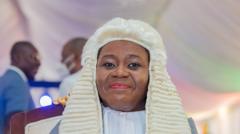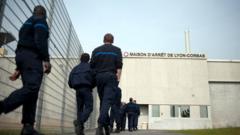The suspension of Ghana's Chief Justice, Gertrude Torkornoo, has sparked a fierce backlash from opposition lawmakers, who accuse President John Mahama of attempting to manipulate the judiciary to favor the ruling party. This unprecedented action is framed as a significant threat to judicial independence and due process.
Opposition Denounces Chief Justice Suspension as Executive Overreach in Ghana

Opposition Denounces Chief Justice Suspension as Executive Overreach in Ghana
Tensions rise in Ghana as the suspension of Chief Justice Gertrude Torkornoo ignites accusations of abuse of power by President John Mahama.
The article text:
The recent suspension of Ghana's chief justice has ignited significant controversy and backlash from opposition lawmakers who have accused President John Mahama of wielding his power to influence the judiciary. Gertrude Torkornoo, who has held the position since 2023, was removed from her role in an unprecedented move that marks the first such suspension in the nation’s history.
The president's decision came after three petitions containing undisclosed allegations against Torkornoo were submitted. Following the announcement of her suspension on Wednesday, a wave of criticism erupted, with opposition MPs asserting that this action amounts to "packing the courts" with judges who align with the ruling National Democratic Congress (NDC) party.
Critics of the suspension described it as a "brazen judicial coup," branding it a reckless exercise of executive power that undermines the independence of Ghana's judiciary. In an official statement, the opposition warned that this move poses a direct threat to the foundational principles of the country's legal system.
Supporters of Mahama defended the suspension as a necessary step to address purported issues within the judiciary, indicating it could lead to a long-overdue reevaluation of its credibility. Dr. Tony Aidoo, a former ambassador, argued that the president is acting to safeguard the judicial system from misguided leadership.
Before her suspension, Torkornoo faced previous legal challenges. Lawyers had filed lawsuits questioning the legitimacy of the president's actions, arguing that he had violated legal protocols by not presenting the allegations to Torkornoo prior to her suspension, a requirement under Ghanaian law. The president later provided her with copies of the petitions after facing backlash for the oversight.
The opposition now claims that Mahama's decision to suspend Torkornoo before resolving these lawsuits further contravenes due process. Meanwhile, two additional petitions were filed against the chief justice, further complicating the matter.
The debate surrounding Torkornoo's suspension is emblematic of the larger struggles within Ghana's political landscape, particularly regarding the judiciary's role and effectiveness. For instance, there has been public sentiment suggesting that the Supreme Court, under Torkornoo's leadership, has favored former President Nana Akufo-Addo in various politically charged cases.
Ghana has had 15 chief justices to date, all of whom have concluded their tenure by retirement, setting a precedent that no chief justice has previously faced removal or forced suspension. The current chief justice, Torkornoo, has notably been Ghana’s third female chief justice and was appointed by Akufo-Addo earlier in 2023. The president had previously dismissed a request to remove her, citing numerous deficiencies in the petition.
In light of the ongoing turmoil, a five-member committee has been established to investigate the allegations lodged against Torkornoo, as the political divide intensifies over the future of Ghana’s judiciary.
The recent suspension of Ghana's chief justice has ignited significant controversy and backlash from opposition lawmakers who have accused President John Mahama of wielding his power to influence the judiciary. Gertrude Torkornoo, who has held the position since 2023, was removed from her role in an unprecedented move that marks the first such suspension in the nation’s history.
The president's decision came after three petitions containing undisclosed allegations against Torkornoo were submitted. Following the announcement of her suspension on Wednesday, a wave of criticism erupted, with opposition MPs asserting that this action amounts to "packing the courts" with judges who align with the ruling National Democratic Congress (NDC) party.
Critics of the suspension described it as a "brazen judicial coup," branding it a reckless exercise of executive power that undermines the independence of Ghana's judiciary. In an official statement, the opposition warned that this move poses a direct threat to the foundational principles of the country's legal system.
Supporters of Mahama defended the suspension as a necessary step to address purported issues within the judiciary, indicating it could lead to a long-overdue reevaluation of its credibility. Dr. Tony Aidoo, a former ambassador, argued that the president is acting to safeguard the judicial system from misguided leadership.
Before her suspension, Torkornoo faced previous legal challenges. Lawyers had filed lawsuits questioning the legitimacy of the president's actions, arguing that he had violated legal protocols by not presenting the allegations to Torkornoo prior to her suspension, a requirement under Ghanaian law. The president later provided her with copies of the petitions after facing backlash for the oversight.
The opposition now claims that Mahama's decision to suspend Torkornoo before resolving these lawsuits further contravenes due process. Meanwhile, two additional petitions were filed against the chief justice, further complicating the matter.
The debate surrounding Torkornoo's suspension is emblematic of the larger struggles within Ghana's political landscape, particularly regarding the judiciary's role and effectiveness. For instance, there has been public sentiment suggesting that the Supreme Court, under Torkornoo's leadership, has favored former President Nana Akufo-Addo in various politically charged cases.
Ghana has had 15 chief justices to date, all of whom have concluded their tenure by retirement, setting a precedent that no chief justice has previously faced removal or forced suspension. The current chief justice, Torkornoo, has notably been Ghana’s third female chief justice and was appointed by Akufo-Addo earlier in 2023. The president had previously dismissed a request to remove her, citing numerous deficiencies in the petition.
In light of the ongoing turmoil, a five-member committee has been established to investigate the allegations lodged against Torkornoo, as the political divide intensifies over the future of Ghana’s judiciary.






















